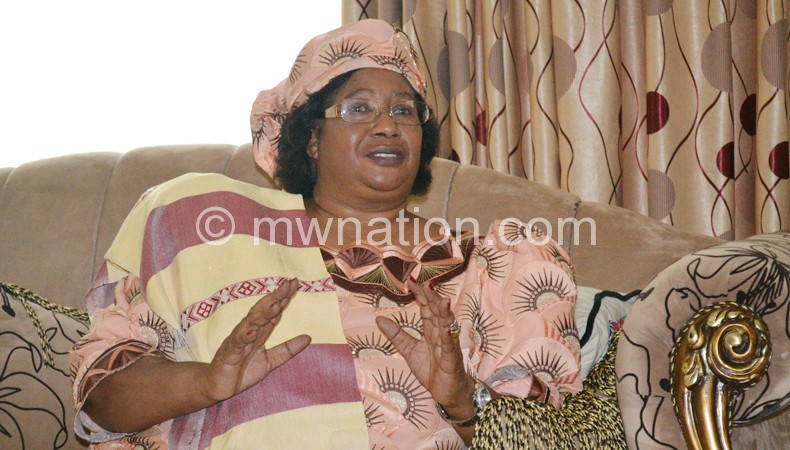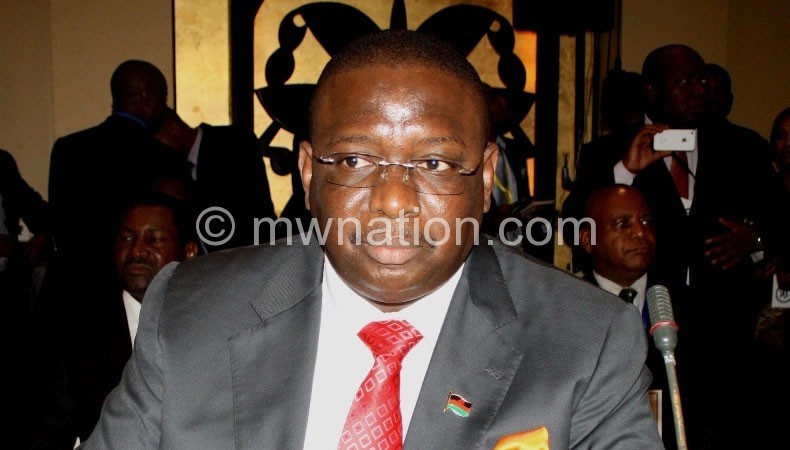AG snubbed JB on land deal meets
Attorney General (AG) snubbed the Joyce Banda administration State House meetings, which the principal legal adviser felt would interfere with the court case in which Diab Dairy Farming Limited had sued Lilongwe Water Board (LWB) and the AG.
This is according to parts of the contents of chief State advocate Zolomphi Nkowani’s response to a letter from LWB lawyer Pempho Likongwe.

Likongwe’s letter, among other things, accused the AG of conceding too much to Diab in an out-of-court deal at the expense of government’s own parastatal fighting to safeguard Lilongwe City’s only water source.
“I note reference is being made to the sentiments of State House against the proposed development. Counsel, you will note from the record, that these meetings were taking place while the case was in court. You will also note that the Hon. Attorney General declined to attend the meetings at State House to discuss a case that was in court.
“Your client’s records will also show that neither the Hon. Attorney General nor the Solicitor General or any officer handling this case attended the State House meeting despite being invited. The reason was that the professional conduct of matters can only be informed by relevant facts and prescriptions of law and not otherwise and for matters in court the proper forum is the court itself,” wrote Nkowani in his July 25 2014 letter to Likongwe that we have seen.

In his July 17 letter that Nkowani was responding to, Likongwe, among other things, questioned why the AG had signed a consent order with Diab that essentially authorised the firm to continue with a dairy project that government, “in various meetings at the level of State President and State Vice-President” had strongly opposed.
Likongwe claims in the letter that when he met Nkowani to ask him why government had shifted its position on the project—as evidenced by the consent order that appeared to allow it—Likongwe claims that the chief State advocate told him verbally that the then vice-president Khumbo Kachali had instructed him to allow Diab to construct the dairy farm.
But when the LWB board chairperson and management cross-checked with Kachali about the directive, alleges Likongwe in the letter, the then veep denied ever issuing such an instruction.
Kachali, according to Likongwe’s letter, told the LWB team that his position remained that Diab should not be allowed to construct the dairy farm as advised by the Town and Country Planning Committee.
But in the July 25 response to Likongwe, Nkowani denies mentioning to the LWB lawyer that he was under instruction from Kachali.
Nkowani told Likongwe in the letter: “In the past, as well as at the meeting of 19th May 2014, you made this allegation that I had informed you that I got instructions from the Rt. Hon. Khumbo Kachali and on that basis effected a change of government’s position. When this allegation was made, out of courtesy, I chose not to respond and maintained that this is a legal dispute that need to be resolved or contested only on the basis of relevant facts and prescriptions of law and not otherwise.
“…My humble response is that the allegation, albeit serious, made against me and Rt. Hon. Khumbo Kachali is not true. I have never met Rt. Honourable Khumbo Kachali, nor taken any instructions from him let alone say this to you counsel or indeed anyone. At no point had he given me or any officer dealing on this case instructions to change government’s position on the matter; in fact the Attorney General does not take legal advice or, for that matter, instructions on the conduct of case from anyone. I find such allegations unfair. I have been resisting responding to them, but since they have now been put on record, it is only proper that I clarify the position.”
On Likongwe’s statement regarding change of government’s position on the Diab project, Nkowani said the conduct of the AG is guided only by relevant facts and prescriptions of law.
LWB’s pollution concerns
It was LWB’s protest to the Lilongwe Town and Country Planning Committee that led to the rejection of Diab’s project on grounds that it would pollute the parastatal’s water treatment area.
Explaining the board’s basis for fighting against the Diab dairy project, then LWB general manager Gabriel Gonani said in a letter to the secretary for Lands, Housing and Urban Development dated July 29 2011: “As [LWB], we feel that the only source of water for the capital city of Malawi need to be safeguarded. Further pollution to this source will mean exorbitant water treatment costs resulting in expensive portable water to the residents of the city. Eventual closure of the treatment works would be very eminent in such an environment and [LWB] would have failed to carry out its mandate and the precious lives of people would be at a huge risk.”
In its information and position paper on Diab’s dairy project, LWB explains that water pollution from dairy farms not only damages the environment but it can also sicken and kill human beings.
Livestock manure is high in ammonia concentrations which, when dissolved, can be converted into dangerous nitrates, according to the board.
LWB adds that elevated nitrate levels in drinking water are highly poisonous to humans, causing potentially fatal oxygen levels in babies (commonly known as blue-baby syndrome), spontaneous abortions and possibly cancer.
Manure also contains high-level pathogens which, when applied to fields, can find their way into water bodies during run-off from either rainfall or irrigation, argues the board.
“The impact of pathogens from manure is severe and, if not careful, it can cause deaths,” says LWB.
It adds that high nutrient levels from animal waste can be fertile ground for waterborne microorganisms that may cause eye and respiratory irritation, gastrointestinal problems, fatigue, memory loss and confusion.
The high concentration of heavy metals such as copper and zinc, essential nutrients for animal health, especially cattle, could get into soil and water bodies as excreta, which may cause kidney problems, nervous system disorders, headaches and cardiovascular problems.
Double standards?
In various documents that we have reviewed, Diab senses elements of double standards on the part of LWB, arguing that while LWB has vehemently opposed its dairy project, there is a large dairy farming company that has been operating within the same catchment area for decades and could be emitting the same nitrates and pathogens that the board is suddenly afraid of yet the water supplier has never moved to have it relocated.
There is also a regional livestock research project around the area that may also be polluting the area.
Furthermore, just upstream, there are a graveyard whose decomposed bodies probably also seeps into the area that LWB now wants to protect.
In fact, according to minutes of a government technical committee meeting on the proposed dairy farm held in October 2009, some members asked what would happen to similar development projects such as the dairy farm that are already operating in the area given that Diab’s has been rejected.
The response, according to the minutes, was that if a request came from LWB, the Ministry of Lands would act.
The meeting’s chairperson also told participants that he hoped they had learnt that making hasty decisions without consultations could be disastrous.
And at an earlier meeting on June 19 to discuss the same issues, the meeting’s chairperson “expressed concern about the apparent double standards shown by the committee”.
He said when the developer was present at the proposal review meeting before being sent out, members of the technical committee showed objectivity and even proposed recommendations on how best to implement the project. There were even indications that the projects “were permissible”, according to minutes of the meeting.
Which way Environmental Affairs?
The Environmental Affairs Department’s decision to award an Environmental Impact Assessment (EIA) certificate to Diab, despite noting several risks whose mitigation measures appear not to have been clearly spelt out, point to a decision made in a hurry. The certificate—issued on July 24 2006—was revoked on January 6 2010.
Further, four years after issuing the certificate and almost at the same time the certificate was withdrawn, the Environmental Affairs Department wrote Diab in January 2010 that they had apparently “studied the matter carefully” and concluded that “the proposed development is not permissible at the proposed location” due to the following reasons:
- The introduction of the project may eventually result in increase of nitrates in Lilongwe River, which is a drinking water source. The water treatment plants at LWB—designed in the early 1960s—were built to treat only natural water; therefore, was not capable of removing nitrates.
- Both Lilongwe City Council and LWB do not have the capacity to manage the pollution that would emanate from activities of the project.
- The area proposed for development of Diab Farm was initially zoned for forestry to conserve the catchment area; and
- Although there are proposals of constructing an aqueduct—which could treat nitrate contaminated water—the proposal is at feasibility stage and may not take place in the short term.






I dont see JB’s hand in this.